From Hell And Back: The Eddie Campbell Interview
Jun 27, 2018
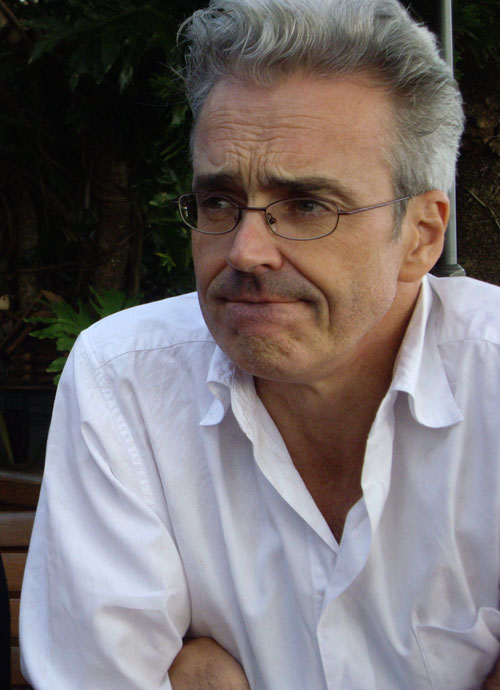 |
by Allyn Gibson
Thirty years ago, Alan Moore and Eddie Campbell, two of Britain’s most revolutionary and unique voices in comics, joined forces for the epic limited series, FROM HELL. Not so much a celebration of the 100th anniversary of the “Ripper” murders in London’s Whitechapel district, FROM HELL was better described as a dissection or autopsy of the persons, locations and events that made up the case, as well as the various rumors and legends emerged over the years since Jack the Ripper disappeared. Over the span of the series’ ten issues, Moore and Campbell not only revealed little-known information about the Ripper, London, and British society of the period, but attempted to perhaps reveal a possible identity of the mysterious and brutally talented murderer...
This July, IDW’s Top Shelf Publishing (in association with the UK’s Knockabout) brings Alan Moore and Eddie Campbell’s landmark series back to comic shops with From Hell Master Edition #1 (JUL180935), a newly colorized and updated edition of the series, featuring newly added coloring, as well as all of the annotations for the collected issues (two per volume). We were lucky enough to speak with Eddie Campbell about the new edition as well as the background on this important and massive undertaking.
****************************************
Allyn Gibson: How did From Hell originally come about? Did Alan Moore approach you, did you approach Alan, did a publisher put you together on the thought that the two of you would work together well?
Eddie Campbell: It was 1988, one hundred years after the infamous Whitechapel murders. It was thirty years ago this year that we started From Hell, and twenty years ago that we finished it in 1998. An invisible curve rising through the centuries. Can history then be said to have an architecture? The notion is most glorious and most horrible. Actually, Alan Moore talked to Steve Bissette about writing a serial about the subject to start in the second issue of Bissette's anthology, Taboo. They started casting around for an artist and I was nearby as I was one of the contributors to the first issue of the same anthology with a peculiar and disturbing little story titled "The Pyjama Girl." I must have seemed an odd choice at the time because horror was not a subject that I had dipped into and “The Pyjama Girl” was almost unclassifiable. But Alan wanted to come at this thing from an unusual angle. Several chapters would appear before anybody except Ripperologists knew it was to be about the Whitechapel murders, or any murders for that matter. It was important to set our events in a world of studied normality.
Allyn Gibson: From Hell has the story of the Jack the Ripper murders at its core, but it seems to be about something much wider than that, namely, the birth of the modern world. How would you characterize the book, and what did you want readers to take away from it?
Eddie Campbell: Well, when Alan gets going he's like the lava out of that volcano in Hawaii, sweeping up everything in his molten path. Quite early he lays out the architecture of London in a Satanic pattern, but the compelling idea he's getting at is about the architecture of Time, as I hinted above. We come to see that this isn't just a factual retelling of the case, or a forensic investigation in the form of a narrative, though there is the kernel of that in the flesh of the story. There is enough of that to keep the Ripperologists busy, but the real heart of the book is something deeper. The world teetering on the brink of the 20th century, whatever that was and whatever we think made it something to take account of.
Allyn Gibson: How versed were you in Ripperology when you began work on From Hell? Did you have a preferred suspect for the killings before working on it?
Eddie Campbell: I had read the paperback book that proposed the conspiracy theory, because a friend had put it in my hand and told me to read it. That was about ten years before From Hell. Conspiracy theories are, by their nature, always great stories and totally convincing. You can have multiple theories, with each one being a certainty, but all of them can't be true at the same time. Jack the Ripper, for some reason, continues to grab the imagination. I have been vaguely aware that a handful of new theories have come along in the last few years since we finished with it. But I have never gotten involved with them enough to want to place a bet on any particular suspect. And I'm certainly not claiming that our book names the man once and for all. That was never what interested us. We introduce our grandiose villain right at the start and from there it's about getting inside his mind. We're not interested in playing whodunnit parlor games.
Allyn Gibson: How extensive was your research in recreating the Victorian world for From Hell? How much time did you spend poring over books and photographs, perhaps even walking the streets of Whitechapel?
Eddie Campbell: It all seems so long ago now, and it was a lot of hard work. But my theory about setting a book in the past is that the details of gaslamps and top-hats should quickly become familiar and the reader should be like a Victorian, who walks down the street and hardly notices his or her environment just as we take ours for granted. The artist should focus on the things that make us alike rather than different. The way we bunch up inside our coat at the approach of winter, the mouthwatering appreciation of the froth on an amber beer, the scratchy irritation of sleeplessness…
Allyn Gibson: What was it like working with Alan Moore on From Hell? What were his scripts like? (We heard a rumor that Moore wrote the story in a long-form letter rather than a traditional script.)
Eddie Campbell: You must remember that we started out in England in the 1980s, and the whole business of making comic books being then foreign to us, we felt at liberty, or compelled I should say, to make up our own ways of doing it. Alan scripts in such a way that he sees the whole thing complete in his head and describes what he is seeing in very precise detail. He scripts a picture that works because he sees it as a picture in his head. He doesn't see it as a movie, or some recollection of something that may or may not have once taken place. He describes a picture, down to telling you what size it is, what the characters are wearing, what the background details are, and then describes the picture next to it, and if there are eight pictures on the page instead of nine, with two portions of the grid adjoined to make a one larger image, he tells me that right at the top. And much of it is beautifully poetic. I often thought it was sad that only I was reading it all. (Check out the From Hell Companion [MAR131301] if you want to learn more on this theme.)
Allyn Gibson: From Hell: The Master Edition will feature the story in color for the first time. Why did you decide to colorize From Hell, and what's your working process for colorizing the original black and white artwork?
Eddie Campbell: When we made the work as a serial in the first place, color was just out of reach for economic reasons. And in Britain that was no big deal. We were well used to black and white. So, I designed the art to be essentially monochrome and that was part of the character of the book. Later, I even resisted an offer to color it in because at that time it would have meant brushing colored inks over reproductions of the pages, or doing mechanical hand-separations like the way color was done a hundred and more years ago. I remember we were doing it that way on our covers in the late 1980s. It was labor intensive and no way to do a whole book, so colors tended to be simplistic by default. Computer coloring only started coming into play in the 1990s and that has enabled quite a different way of doing colors nowadays. We can do 'millions' of hues without thinking too hard, although it is no impediment to success to put a lot of thought into it, I should say. Put simply, color gives me a whole new layer of expression to add to the many layers that already make up From Hell.
Allyn Gibson: One memorable sequence in From Hell is the tour of London in which Sir William Gull explains to the coachman, Netley, the occult meanings of the architecture of Nicholas Hawksmoor's churches. We understand you are adjusting some of the artistic details in this sequence for the new edition of From Hell. Was this behind the remastering and coloring of From Hell, or had the idea of revisiting From Hell and updating it been working at the back of your mind for a while?
Eddie Campbell: In thirty years one gets to second guess a lot of the artistic choices. And there are things that are just facts, like the way a horse's legs and shoulder muscles move when it is starting to pull a coach in contrast to when it is stopping. And just the way a coach is built. Every time I would see one in a movie or in a museum I would want to go back and fix something in the book. Well, now I get to fix a lot of stuff, but I hope to do it without rupturing the ragged informalities that made the thing work in the first place; that youthful arrogance that gives us the panache to make it look like we know more than we do. In the second volume, the one with the coach tour of London, the older reader will find that there are ten or a dozen replaced panels he has never seen before. But Han still shoots first.
Allyn Gibson: For readers of the original From Hell, what sort of new experience do you hope they will have with the Master Editions? For new readers, what do you hope they will discover in the book?
Eddie Campbell: The Master Edition is so vivid that it will make the experience of reading the old version feel like you were seeing it though a woolly sweater. It will be like seeing From Hell for the first time. And for the new reader, they WILL be seeing it for the first time.
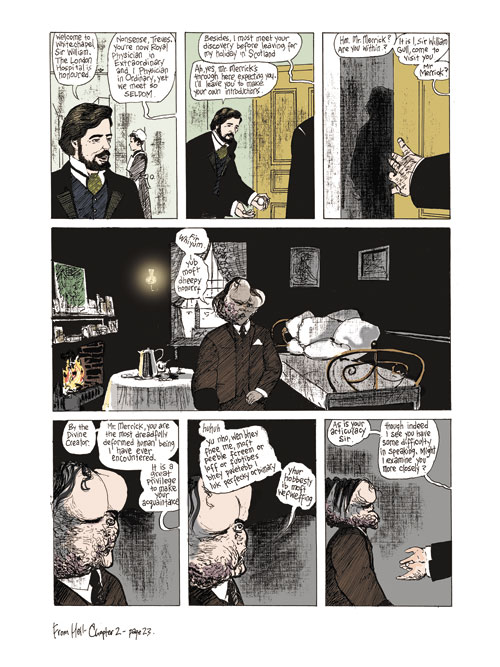 |
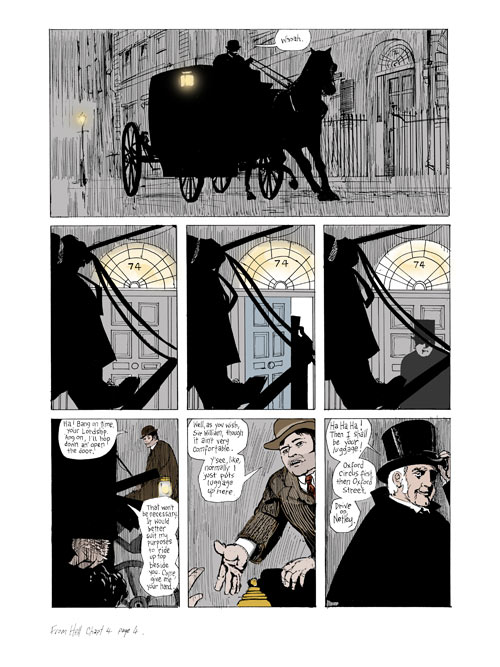 |
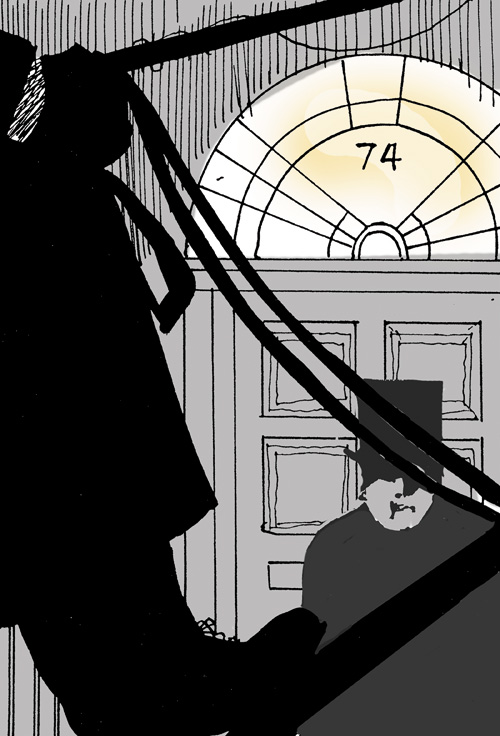 |
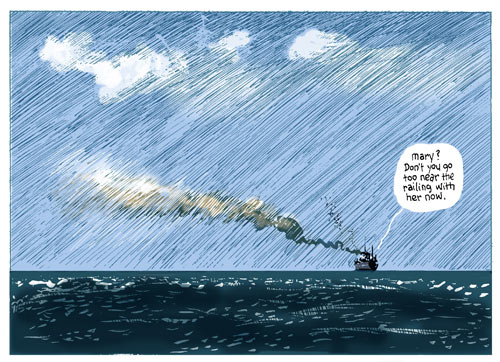 |
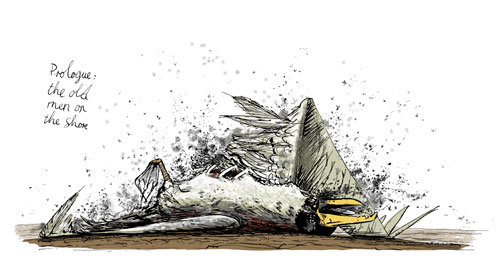 |
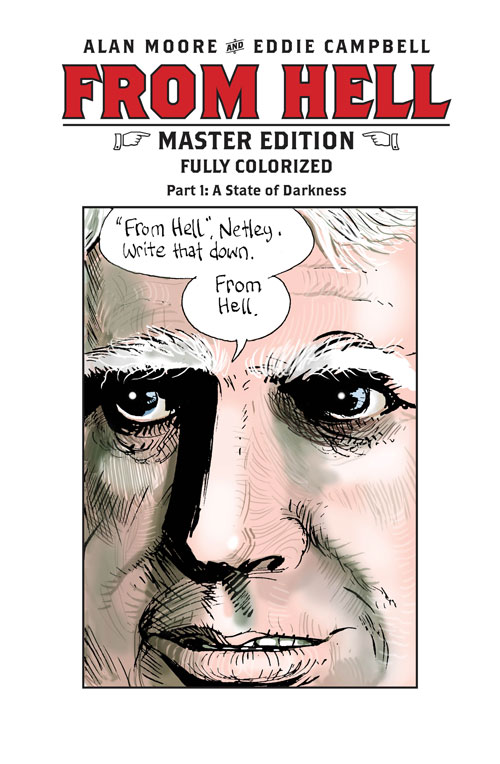 |




